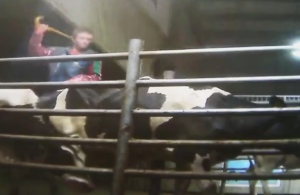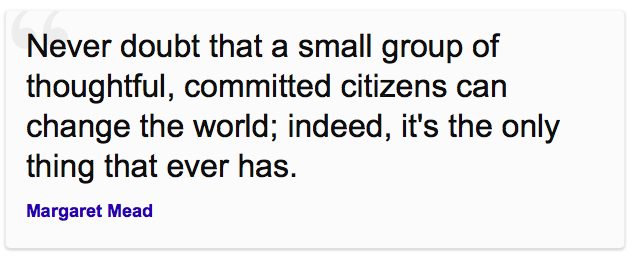Do you know where your milk comes from? Do you have any awareness of the conditions under which it is produced? Like most people who are busy just trying to get through the day you probably don’t give it a second’s thought when you reach for a jug at the supermarket. But many people around here are asking that question today, and I’m glad.
There has been quite an uproar since the release of hidden camera video of abuse at a nearby factory dairy farm, and thank heavens for that. It means people are becoming aware of this very real issue, and that’s where change starts.
I’ve watched more than my fair share of animal cruelty videos and the clips released from the Chilliwack factory farm are bad, but not even close to as graphic as how bad it gets. When I watched Earthlings while visiting my mom a few years ago, I barred her from entering the room while I watched it, tears pouring down my cheeks. From the doorway, her forehead creased in concern, she asked why I watched it if it was so upsetting. I didn’t want those images burned on her brain, but “Someone has to, we need to know the truth.” I felt it was a painful but necessary eye-opener.
CAUTION: Graphic images, viewer discretion advised.
I’ve written here at LocalDelicious.com about other related footage, including I Lost My Appetite Watching Our Daily Bread and Supermarket Secrets but I haven’t written about those kinds of things in a while. Mostly because I don’t watch those kinds of videos much anymore. It’s not because I don’t care. It’s because I care too much. It broke my heart and left me feeling overwhelmed and powerless. On some level we ALL know there are serious issues with the treatment of animals in the food production industry. We can’t be faulted for not wanting to think about it when it leaves us feeling bad.
What We Can Do
I want to talk about those issues differently now, focused not on retelling the stories of abuse over and over and staying stuck there, but rather on what we can do. And there are things we can do. Mostly it has to do with voting with our wallets and our attention. There are people who produce quality products and treat their animals humanely and it’s time for us to find them, support them and tell others about them. Let me say that again:
There are people who produce quality products
and treat their animals humanely. It’s time for us to find them,
support them, and tell others about them.
One of the first places to start, if you want to join me in building the momentum of change, is your local farmers market. Stop in, meet the people producing the food, find out how they’re doing it and whether you can ethically support it. Start small, with a single purchase. One drop in the ocean. There are lots of us joining you, more every day.



I didn’t watch the video. I’m far to sensitive to watch cruelty. We started buying organic milk many years ago. Do you think that means the cows are treated better?
You ask a great question, one we should all be asking, “What exactly does the organic label mean?” We can easily be fooled into thinking it means a pastural setting that harkens back to Little House on the Prairie days, but as we learned with Organic Eggs and Factory Farming, that is not always the case.
With respect to dairy, farms are inspected, but an inspection is only as good as the regulations it is meant to adhere to. Canada’s regulations (scroll down for the details) cover access to outdoors, quantity and quality of grazing, feed and supplement quality, allowable medications, minimum acreage per animal and other health and welfare criteria. As for general welfare and handling, it’s a bit worrisome that the documentation refers to “guidelines” rather than standards.
In a nutshell, we can’t all get out to the farm where our milk was produced to see the cows in question, but you’re on the right track making inquiries about what standards include and making ethical choices based on what you learn. Organic is better than factory farming and is definitely a step in the right direction both for our health and for the welfare of the animals.
PS: I concur with your decision not to watch the video. It’s disturbing and heartbreaking, but many people won’t believe until they see it, and are only motivated to change behaviour by “shock and awe” proof.
I did a little more digging and found this document that compares standard factory farming, BC SPCA and BC Certified Organic regulations with respect to animal welfare and handling: http://www.spca.bc.ca/assets/documents/welfare/farm/StandardsComparison_May2007.pdf.
I’m glad to see that these requirements are more specific, but a lot is still left up to interpretation. What does “Animals must be treated humanely, but no specific requirements” mean?